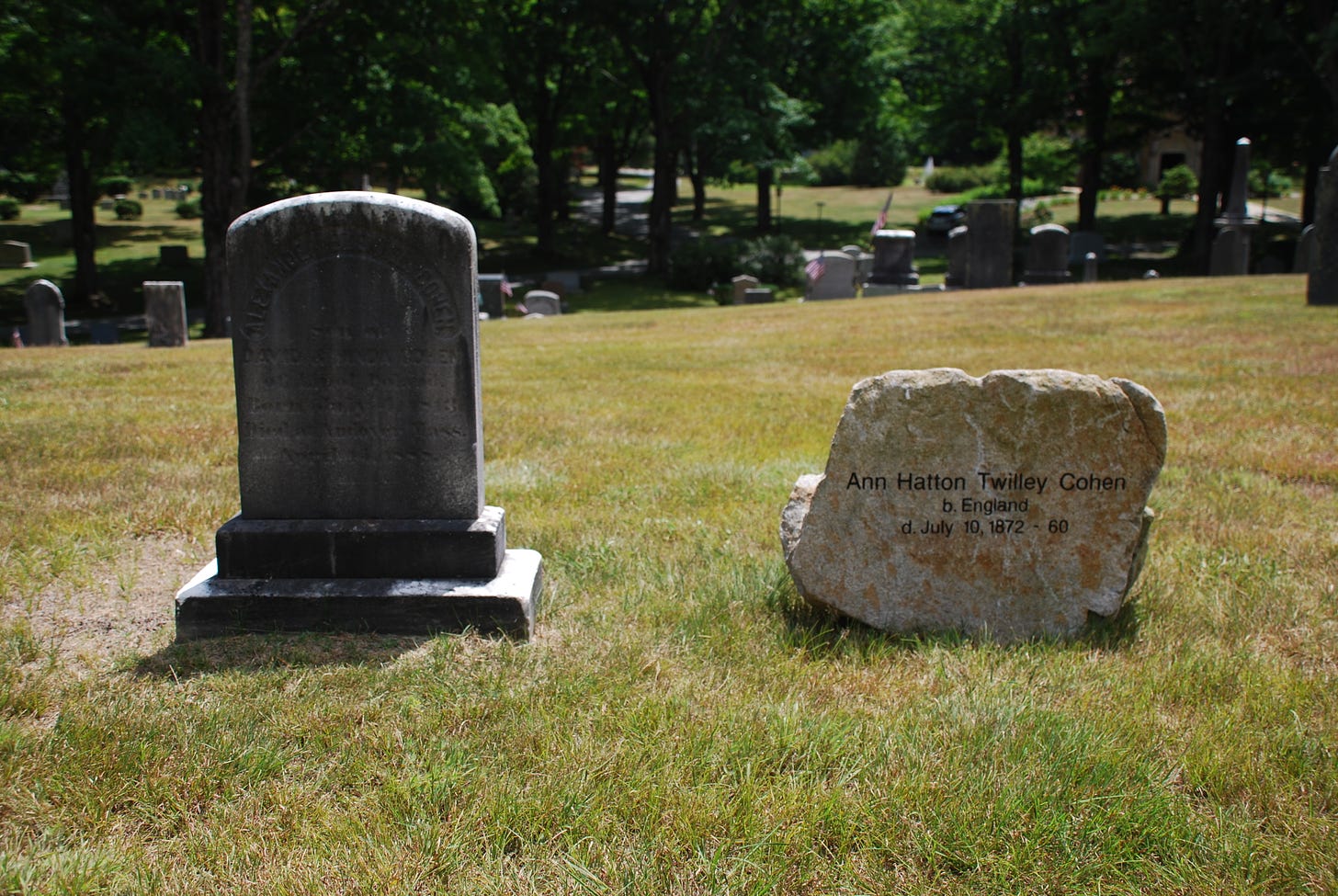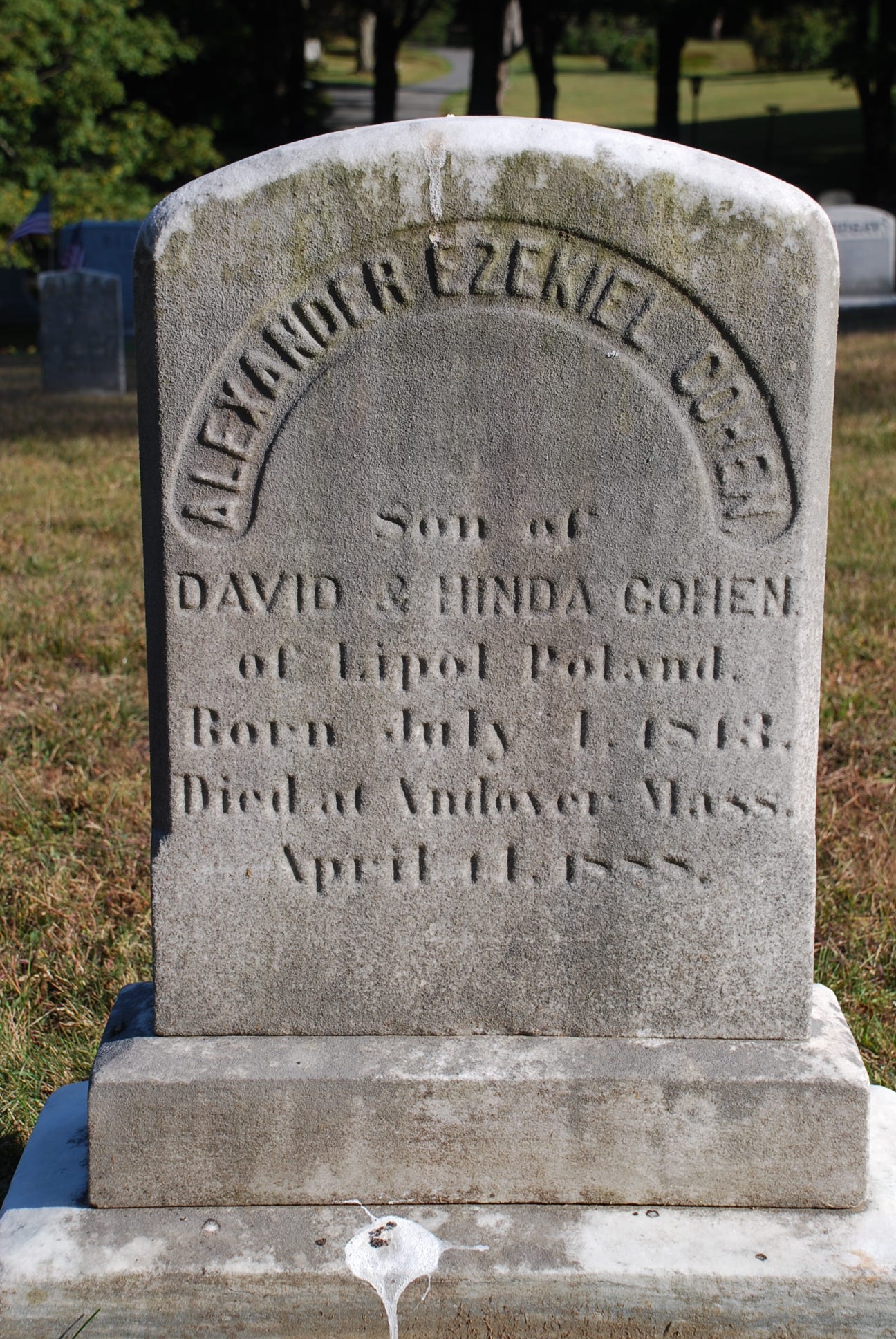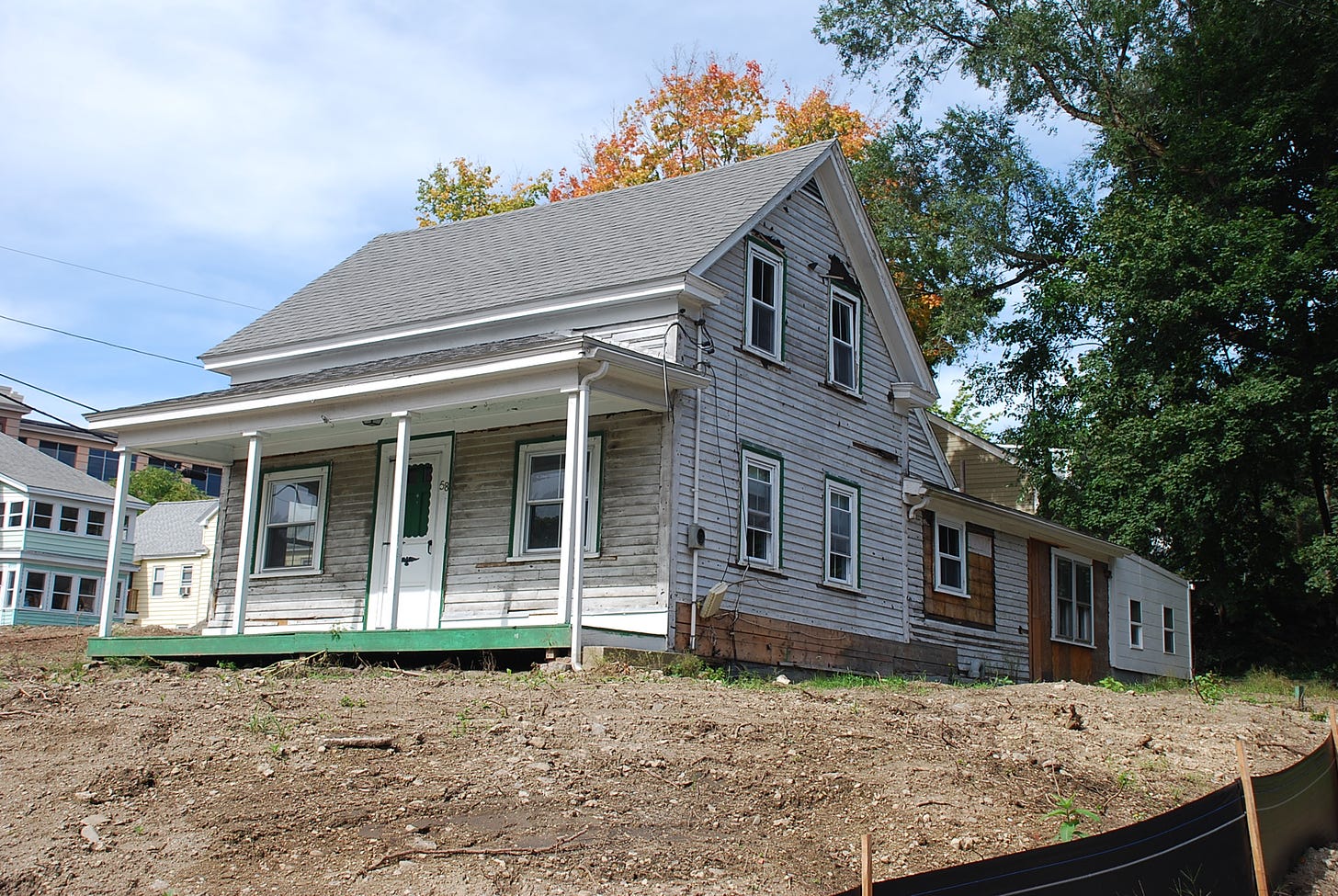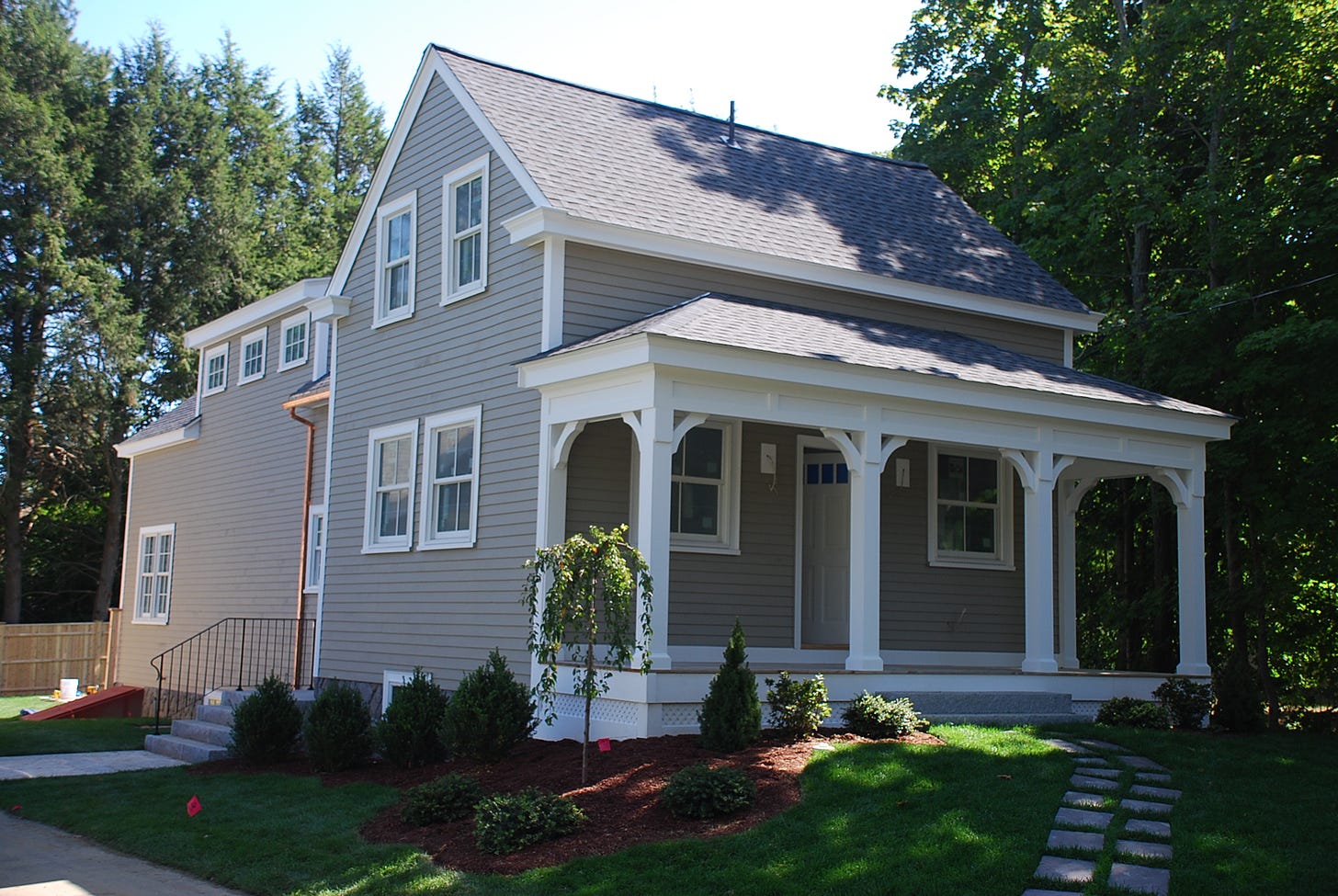"I was determined to carry out Alexander’s wish to have a headstone for Ann, but we needed to find out who Ann was!"
Local historian Jim Batchelder searched to find the true story behind a local tragedy. And then set out to make it right.
Welcome or welcome back to History Buzz! If you’re a subscriber to the Buzz, thank you! If you’re new here, or you haven’t become a subscriber yet, please sign up for a subscription to have History Buzz delivered directly to your inbox.
A walk through any old cemetery is a stroll through the history of a town and families that once made it their home. I have always been fascinated by the epitaphs and iconography on headstones that reveal a snippet into the life of the person interred there. I have also had the pleasure of serving on the board of the West Parish Garden Cemetery in Andover, MA for twenty-seven years. Three generations of my family are resting here, as I will too someday.
The original one acre West Burial Ground was established in 1692 and the first burial, of record, was in 1707. The grounds became the West Parish Cemetery in 1826 with the establishment of the West Parish Church. Enlarged twice by the Parish, the old five acre grounds were transformed into the beautiful 50 acres garden cemetery in 1908 by benefactor William Madison Wood.
Through the years I have given several tours of the grounds and shared its rich history with visitors. One day I noticed a marble headstone with the inscription:
Alexander Ezekiel Cohen, son of David & Linda of Lipol, Poland,
born July 4, 1813, died at Andover, Mass. April 14, 1888.
My first thought was “How did a Jewish man end up in what was then considered a Protestant Congregational cemetery?”
I hoped an obituary might provide the some answers, but I never expected the story that would unfold.
Andover’s two local papers “The Andover Advertiser” (AA) and “The Andover Townsman” (AT) published three lengthy stories about Mr. Cohen. A Boston daily paper and the Chicago Daily Tribune had also published sensationalized obituaries. All held conflicting information, some false and all with unpleasant truths.
Andover Townsman Obituary July 20, 1888
Alexander E. Cohen died at his house on the road leading from this village to North Andover, on Saturday. He had been complaining for some time, and had not been out much for a few days. On Saturday, he called through the window to a neighbor, and sent to Mr. Allen of the Almshouse to come for him. When Mr. and Mrs. Allen came to see what they could do for him, he was dead. His body was taken in charge by Undertaker Charles S. Parker, and at his rooms passages of Old Testament Scripture were read and a prayer offered by Rev. J. V. Stratton on Monday afternoon, before his burial in the West Parish cemetery; where his wife was buried several years ago. The deceased was a Polish Jew and came to Andover from Lawrence in 1861. He lived at first in a tenement house in Baker's Lane, afterwards buying the house and land where he has since lived. He was very eccentric, and would seldom allow anyone to enter his house or know anything of his affairs. A little over a year ago he attempted to commit suicide, and at that time was taken to the Almshouse, but that was too clean a place for him, and he soon returned to his abode of dirt and rubbish.
The story grew when a Boston daily paper published an obituary:
“DEATH Of A MASSACHUSETTS HERMIT –
He Was a Fine Scholar and Had Some Money, but Did Not Enjoy It”
The article stated that Professor Alexander Cohen was a hermit who once was a teacher, scholar and had held a chair at the Andover Theological Seminary. It also stated that his wife was of noble birth and died in poverty.
The Andover Townsman refuted most of the story as news items about Cohen continued.
What we did learn was Alexander was married to a woman named Ann, who was born in England and buried in West Parish Cemetery. Ann had died on July 10, 1872 of consumption. The cemetery records however did not list Ann’s burial and there was no headstone to mark her grave.
The years that followed after Ann’s death were not kind to Alexander.
Depressed by the loss of the love of his life and now alone, Alexander became a recluse and lost all interest in his personal well-being and the upkeep of his property.
Adding to his misery, on September 10, 1875, the Andover Advertiser reported that,
“Two cows belonging to Alexander E. Cohen of Frye Village, have recently died from eating dry wild cherry bushes.”
A few years later, the Advertiser reported on November 18, 1881
“The house of Alexander E. Cohen in Frye Village was broken into a few nights since and $25 dollars stolen there from. Mr. Cohen was in bed at the time. On an evening not long since, as he was entering his barn, two men put a coat over his head and demanded money, but did not get any. Mr. Cohen is an inoffensive man and the boys should be made to cease teasing him, as they have been accustomed to do.”
When Alexander’s health deteriorated, he was moved to the nearby Almshouse for care. He spent a few days under their care but always returned to his home. After his death his house became a local curiosity as it was filled with 12 years of accumulated trash and his personal belongings scatted about by intruders and children. The windows were finally boarded up by the local police.
There were some kind remarks about Alexander.
“When Mr. Cohen succeeded in making an acquaintance of a few people, he was found to be very social, highly entertaining, and well educated in the board sense of the word”
“One minute he was found in the garden, another engaged in the compilation of a book on the Jewish religion.”
“This was the end of a man who has been wrongfully abused and who, in spite of his Jewish birth, was a Christian at heart.”
Alexander’s story might have ended here had I not stumbled across a story “Reminiscences of Frye Village” of Alice Morrison Bell in the files of the Andover Center for History Culture transcribed in 1950. Alice’s comments about Mr. Cohen.
“Living in a wee house beyond the Railroad tracks on Haverhill Street was a small Russian Jew, named Cohen. He was a well-educated man. He lost his wife and at the same time all standards of personal cleanliness. He was lonely and because of his unkempt condition, no one could associate with him. He walked the street and all the children would run when they saw him coming near. If far enough away for protection, they would call names, which plagued him. He was fond of children and animals and flowers.
His cats and hens and dog used to share his house with him and his flowers liked the dirt and grew well for him. Always in the spring, he had the loveliest lilacs and the children would muster up the courage to beg a few branches – but when he would appear at the door with the knife to cut blossoms, one could not see the children for dust.
He was so dirty that some of the town men took him to the old Slaughter house, there being no free baths with abundance of hot water and soap, and gave him a real Turkish Bath and a supply of clean clothes.
One day he took a good sized field stone from his land and marked on it his wife’s name, date of birth and death – put it on a wheelbarrow and started for the West Andover Cemetery – Just before he reached the Richardson school it rolled off into the gutter and there it stayed until the weather wore off the paint.
Alice’s last statement broke my heart!
I was disappointed in the people of Frye Village as no one took it upon themselves to see that the stone made it to the cemetery. I was determined to carry out Alexander’s wish to have a headstone for Ann but we needed to find out who Ann was! The Andover Vital Records provided only her death date, cause of death and age but no parents were recorded. With some help from American Ancestors we had some answers.
Who were Alexander and Ann Cohen?
Widow Ann (Hatton) Twilley, daughter of Thomas Hatton, a baker, deceased, married on July 31, 1849 at St. Andrew the Less, in Cambridge, England to Widower Alexander Ezekiel Cohen, teacher of languages. Both were listed as living on Jesus Terrace, Cambridge. Ann’s first marriage was to William Murrels Twilley in April 1839 who had died in July 1847.
Alexander most likely left Poland to escape persecution from the Russians and went to Cambridge, England. Alexander converted to the Church of England and was baptized on Dec. 18, 1842 by James B. Cartwright of Tower Hamlets, Bethnal Green, Middlesex. Alexander’s occupation was listed as “Dealer,” a widower and he lived on Jesus Terrace. It is here that he met the Widow Ann (Hatton) Twilley, a Gilder. It appears that Alexander came to Andover first, then returned to England to bring Ann back. Alexander and Ann immigrated to America on the “Daniel Webster” arriving in New York on August 7, 1861. The following month they would purchase a small home in Frye Village in Andover. Alexander was listed as a farmer and laborer.
Making it right . . . a stone for Ann
The former Cohen House in Frye Village at 54 Haverhill Street, now in the Shawsheen Village National Register District, had survived through the years. In 2015 the property was sold to a developer. Through the work of the Andover Preservation Commission, the Special Dimensional Permit bylaw, and the developer the house was dismantled and moved to a new location at 147 Lovejoy Road.
As part of the move, we asked if the West Parish Garden Cemetery could have a stone from the original foundation of the Cohen house for a marker on Ann’s grave. The stone was hand-picked and delivered to the cemetery in 2019. This past July 2022 the stone was engraved and in August placed next to Alexander’s headstone.

It took 150 years to get a stone for Ann but I can’t think of a better ending to this story. As for their house, it had to pass by the cemetery on its way to a new location about a mile away.
James Batchelder, Andover Center for History & Culture Board member
November 28, 2022
Thanks for reading! Please be a part of the conversation by leaving a comment or question for our author, Jim Batchelder. Your comments, likes, shares, and subscribes help support the work that makes stories like this possible.
Resources:
West Parish Garden Cemetery Burial Records, 129 Reservation Road, Andover, MA westparishgardencemetery.org.
Andover Vital Records – Deaths July 1872, April 1888
US Federal Census Records -Andover 1870, 1880
British Census England 1851 - Cambridge
London, England, Church of England – Birth and Baptismal Records – 1813-1916
England & Wales Civil Marriage Registration Index – 1837-1915 – Cambridge, Cohen XIV 10 Vol 14, pg. 10 – Ann Twilley Cambridge XIV 10
Lawrence American/Andover Advertiser – Volume 1, April 20, 1888 p.4 Andover News, Frye Village, p. 5 Deaths
Boston Daily, Boston, MA April 10, 1888 Special
Chicago Daily Tribune (1872-1922) April 17, 1888 – Proquest Historical Newspapers Chicago Tribune (1849-1997)
Andover Center For History & Culture – ‘Reminiscences of Frye Village of Alice Morrison Bell”, from her estate and transposed by Mrs. Joseph P. Rand, December 15, 1950 – Vertical files at the AHS.
American Ancestors – NEHGS – Newbury Street, Boston, MA – Findmypast.
Ancestry.com Immigration Records.
Andover Historic Preservation website mhl.org
Essex County Registry Deeds, Salem MA
Northern Essex Registry Deeds, Lawrence, MA









Such a beautiful story Jim. You've bestowed Ann and Alexander with so much kindness all these years later. Her grave stone is beautiful and meaningful...
Thank you to everyone for your kind words and remarks. It has been a long journey to get to this point. In the beginning I thought we would inscribe the back of Alexander's stone with Ann's information. That all changed when I found Alice Bell's stories. Best regards to you all.